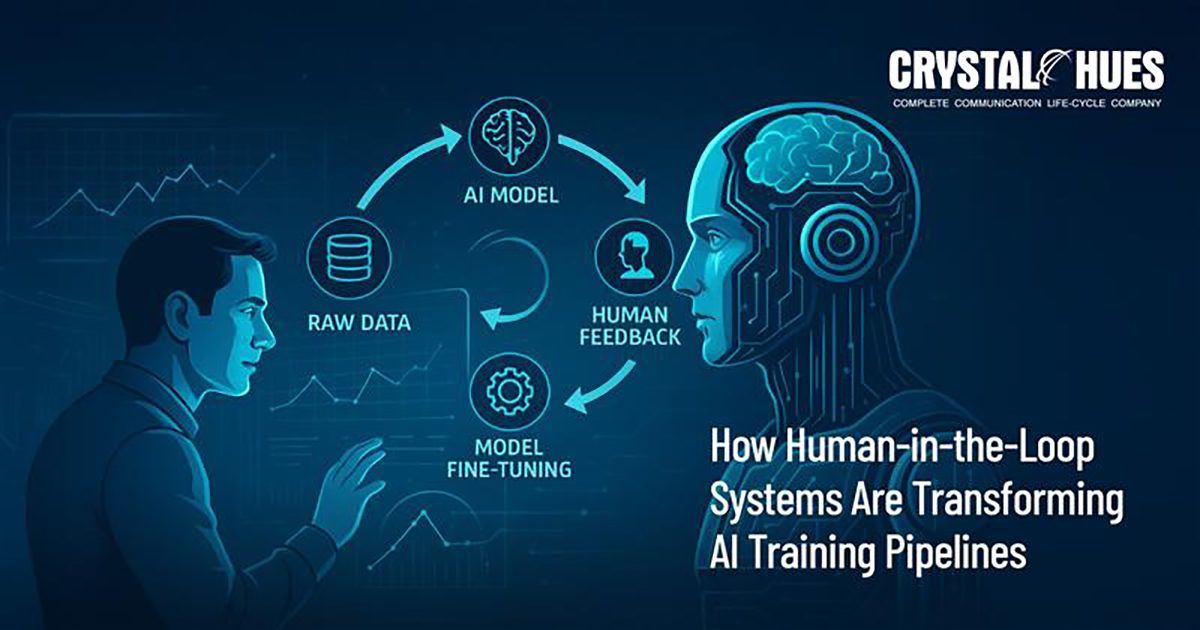
Human-in-the-Loop AI: Why Your AI Model Needs Human Expertise
As advanced as AI may be, one thing remains certain: AI systems will only be as good as their training data.
While machine learning automation continues to progress, human intelligence is an irreplaceable part of building an intelligent system.
Human-in-the-Loop (HITL) AI represents a next generation of
systems integrating cheap computational power with human intelligence that will
produce AI
solutions that are accurate, ethically capable, and, more importantly,
intelligent in context.
This guide will highlight how HITL methodologies are
transforming data services in AI, and why any company developing a production
model AI must leverage this important process.
What Is a Human-in-the-Loop AI System?
The Human-in-the-Loop (HITL) AI system is a machine
learning method that provides human intelligence and feedback at each level of
model development, from early training to continuous training. In essence, HITL
offers an active role for a human in an AI, posing a decision when nuance,
culture, and ethics are needed.
The model still provides efficiency of automation.
Meanwhile, it provides the full value of human efficiency as well.
Machines can provide quickness and scalability. However,
you still need contextual understanding, emotional and critical judgment to
ensure AI systems can perform reliably in more complicated and messier,
real-world ecosystems.
The Importance of Human Intelligence in AI Data
Services
Improved Data Annotation Quality
Machine learning models trained on poorly labeled datasets
will produce inconsistent and generally trash results.
Humans are more capable of understanding factors, including
but not limited to very subtle contextual details - sarcasm in social media,
distinguishing one from three meanings of a word, detecting the tonal cadence
of feelings in audio, etc.
Cross-Cultural and Linguistic
Intelligence
Automated translation and localization software fail
to capture cultural nuances. Meanwhile, human linguists not only ensure that
content is technically accurate but also ensure that the content is culturally
appropriate and emotionally resonant for diverse geographic regions and
demographic groups.
Quality Control and Data Consistency
Even great algorithms exhibit various biases and types of
errors. HITL frameworks can put large quality assurance processes in place and
have humans review selections as well to enforce consistency across large
data.
Domain Expertise
Healthcare, finance, and legal sector require much, much
more than accuracy; they require domain expertise - for example, regulatory
compliance, specialized terminology, and ethics. The advantage of adding humans
to data processing workflows is in validating the expertise.
The HITL AI Development Pipeline
Human intelligence adds value at all levels of the machine
learning development process:
Data Collection & Verification
Human analysts verify the validity of data, confirm
population diversity, and familiarize themselves with human centered ethical
guidelines when drawing from global data sources.
Data Annotation & Classification
Be it entity extraction, sentiment extraction, or image
segmentation, human annotators impose structure on data in real-world meanings
and contribute to the final outcomes of analyzing this data.
Quality Control
Very thorough review processes, as well as inter-annotator
reliability checks and feedback loops developed and maintained by human
experts, improve the quality of the dataset being developed and the
determination of the model.
Localization & Culture
Automated translation and analysis, especially
speech-to-text modeling, is notoriously tone deaf and yet lacks nuance of
culture in behavior. Human linguists can enhance these outputs to produce truly
local and culturally inclusive user experiences.
Model Validation and Ongoing Iteration
This is perhaps the most important role for human experts
in a machine learning system: model validation. Human evaluators can mirror a
realistic user access to AI systems, recognizing the deficiencies in the AI's
capabilities, and identifying how and where to target the human feedback loops
for ongoing model iteration and improvement.
Now that we’ve learned about the importance of HITL
systems, let’s further explore why you need it for specific sectors.
HITL Across Sectors
AI In Medicine
AI image analysis systems in Radiology, used in concert
with a human radiologist, have provided diagnostic accuracy while reducing
medical imaging false positives and estimates.
Financial Services
Fraud detection algorithms combined with human analyst modelling
have reduced customer service errors and transaction misclassification from
very high occurrences to nominal levels.
E-commerce Optimization
Human-in-the-loop (HITL) artificial intelligence systems
have changed the game for product categorization, customer review analysis, and
personalization algorithms, resulting in significantly increased engagement and
conversion rates for users.
Voice Recognition Technology
Speech recognition models now demonstrate significant
advances in inclusivity and accuracy when human trainers help the systems
decipher diverse accents, emotional inflections, and linguistic variants.
The Strategic Advantage of Human-AI
Collaboration
The integration of human expertise into AI development
actually accelerates the adoption of models with the capacity to:
- Rapidly isolate and correct mistakes.
- Accurately tune and optimize models.
- Generate stakeholder confidence and regulatory compliance.
- Create
training across less prevalent or unrepresented use cases.
The human element in the development of AI solutions builds
trust with stakeholders and users, as it conveys that AI systems are designed
intentionally, and with care and inclusive design principles.
Picking the Right HITL Data Services
Partner
When exploring HITL integration for AI projects, seek out
data services partners that offer the following:
- Access to certified linguists and industry experts.
- Comprehensive multilingual and multicultural annotation services.
- Robust data security and compliance (GDPR, HIPAA, SOC 2).
- Infrastructure that is capable of enterprise-wide scaling.
- Transparency
on quality control and quality assurance, including reporting and
feedback.
The Future of Human-Augmented Artificial
Intelligence
The next generation of AI will not be artificial; it will be intelligently augmented. Human-in-the-Loop systems are fundamentally reshaping how organizations collect, process, and use data for intelligent applications, combining the computational power of machines with human wisdom and judgment.
At Crystal Hues, we build human-centred data-flow pipelines
that make sure your AI models are not only trained but are production and
market-ready. Learn how HITL practices will reshape the shape of your AI
initiatives.



